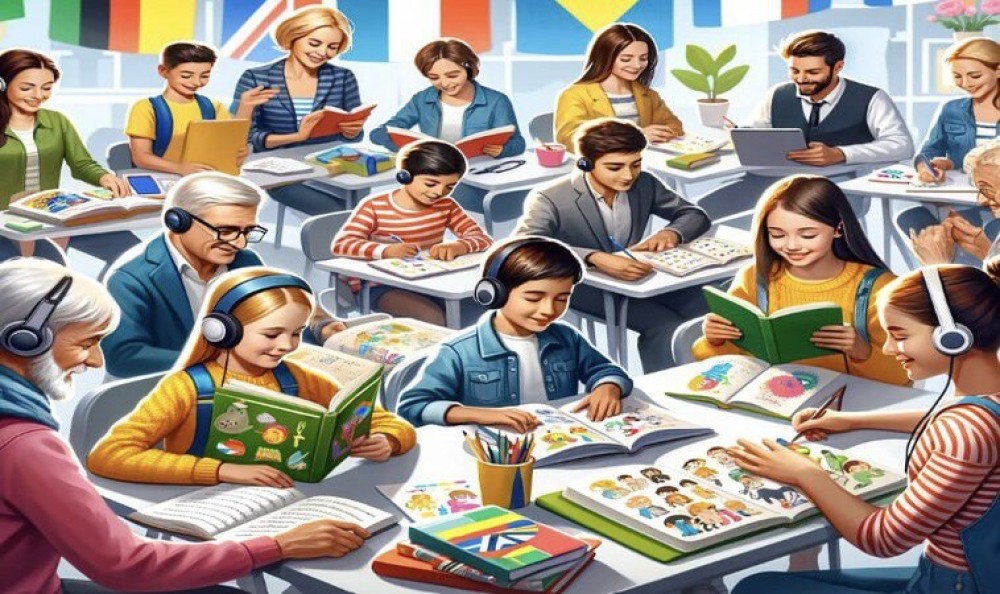Introduction
In the era of globalization, speaking foreign languages is becoming not just a valuable skill, but a necessity that opens doors to international careers, education, and cultural exchange. Extensive research conducted by American foreign language institutes demonstrates how age affects the ability to acquire a new language at the native level and how this process can be optimized depending on the age group.
Learning Languages in Early Childhood
Children under 7 years of age have a unique ability to imitate sounds, which is explained by not yet fully formed language filters. Research shows that children who begin learning a new language before puberty are more likely to achieve pronunciation comparable to native speakers.
Fact: According to a study conducted by the Massachusetts Institute of Technology, children who begin learning a language before age 10 demonstrate significantly better grammar and accent skills than students who begin at a later age.
Teens and Adults
At the age of 10-18 years, the brain continues to remain quite plastic, although with some restrictions compared to early childhood. Teens and adults often have more developed cognitive skills, which help them learn complex grammatical structures and new vocabulary.
Fact: The study, published in the journal Cognition, indicates that adults and adolescents can compensate for decreased pronunciation acquisition by becoming more mindful of their learning and using different memory strategies.
Elderly age
New research is disproving the myth that learning a new language in old age is extremely difficult or even impossible. Learning a new language can stimulate cognitive activity, helping to slow down age-related brain changes.
Fact: A study from the University of Edinburgh found that people who began learning a second language after age 60 showed improvements in a range of cognitive functions compared to their monolingual peers.
Recommendations for Improving Foreign Language Learning

For children:
- Interactive Games and Applications: Using game forms of learning to stimulate interest and maintain attention.
- Immersion in the Language Environment: Early immersion in the language environment through cartoons, music, and conversations with native speakers.
For Teens and Adults:
- Language Courses and Exchange: Participation in language courses and exchange programs for practice and cultural immersion.
- Technological Tools: Use apps and online resources for daily practice and vocabulary development.
For Elderly People:
- Social Groups: Joining language clubs or interest groups where language learning takes place in a relaxed atmosphere.
- Adapted Technologies: Use of specially developed programs and applications that take into account age characteristics.
Conclusion: A Global Perspective on Foreign Language Learning
Research conducted by leading language institutes around the world demonstrates that age plays a significant, but not decisive, role in the ability to achieve native-level language acquisition. These studies confirm that although infants and preschool-aged children have a unique capacity for natural language acquisition, opportunities for language learning do not end with age.
Modern scientific advances in the field of brain neuroplasticity show that our cognitive functions can be flexible and adaptable throughout life. This means that adults and even older people can successfully learn new languages, although they may need more time and effort than children. Interestingly, learning a new language in adulthood not only promotes cognitive development but may also protect the brain from degenerative diseases such as Alzheimer's disease.
In the context of globalization and multicultural interaction, learning foreign languages is becoming an invaluable tool for personal growth, career development, and cultural enrichment. It opens the door to deep understanding and respect for cultural differences, promotes international cooperation and exchange, and develops global thinking and empathy.
To sum up, we can say that the key to successful learning of foreign languages lies not so much in age, but in teaching methods, motivation, regularity of practice, and the willingness to accept and overcome challenges. Regardless of age, learning a new language takes time, patience, and dedication, but thanks to modern technology and resources, access to learning is easier and more effective than ever.
It is also important to emphasize the role of social interaction and cultural immersion in the language-learning process. Real-life interaction with native speakers, participation in cultural events and travel provide invaluable experiences that not only improve language skills but also enrich personal life experiences.
In conclusion, regardless of age, learning a foreign language is a journey of discovery and achievement. This is a path that requires effort, but at the same time offers extensive opportunities for development, communication, and understanding of the world in its diversity. Knowledge of foreign languages in the modern world is not just an asset, it is a bridge connecting cultures, peoples, and ideas, contributing to the creation of a more open and mutually understanding world.


